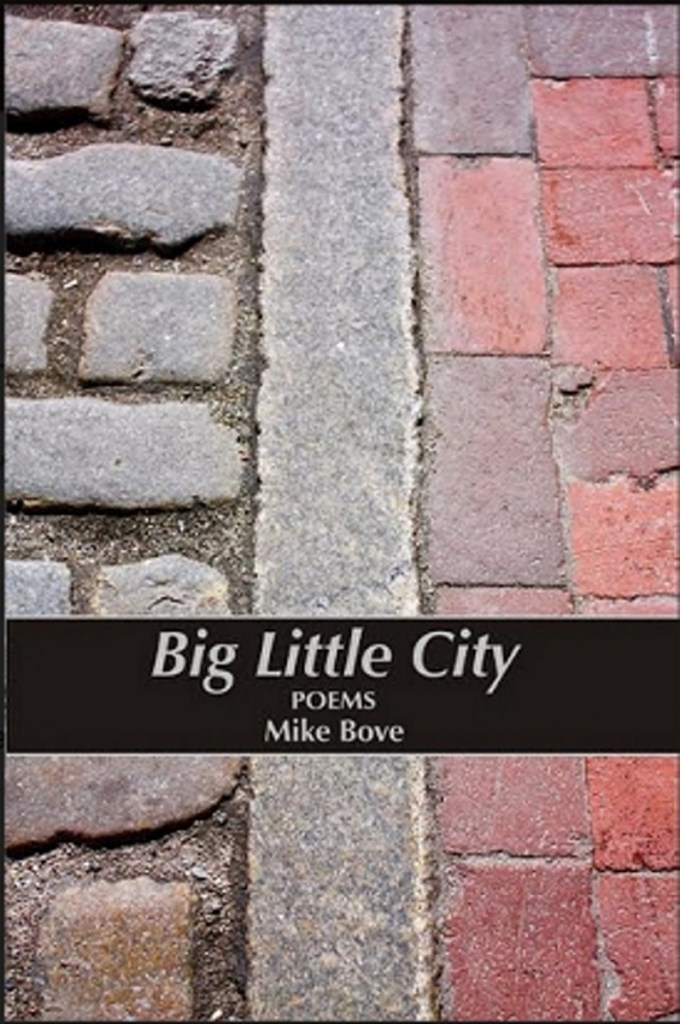“Big Little City: Poems” By Mike Bove
Moon Pie Press, Westbrook, Maine, 2018
94 pages, paperback, $15
Partway into my first read-through of “Big Little City” by Mike Bove, of Portland, I thought: “What a long, strange trip it’s been from ‘Mexico City Blues.'”
Jack Kerouac’s book came to mind partly because I’ve recently been editing the collected poems of another Portland poet, Peter Kilgore, who in the 1960s through ’80s was a skillful follower of the currents set up by Kerouac and the Beat poets. And partly because Bove’s poems are such good examples of one place those currents have led, almost exactly 60 years later.
“Mexico City Blues” (published in 1959) overflows with bust-loose energy and a fascination for how love calls us to the things of this world, to invoke another, related strand of American poetry. The compulsion to frame up these energies in words got taken to heart, so to speak, by poets and creative writing professors from Maine to Monterey and beyond and became a sort of topical thread: The energies that light up or darken your own personal life.
There have been and are, of course, millions of ways to give expression to this very general material, and inevitably the approaches underwent refinements. What struck me about the poems of Bove, an associate professor at Southern Maine Community College, are: one, his energy for mainly very domestic, homespun experiences, kind of the yang of Kerouac’s road-venturing yin; and two, his mainly very meticulous attention to grammatical and syntactic accuracy, in the range of what has developed basically as the high poetic diction of our time — which I want to say has derived, at least in part, from the effusive “first thought, best thought” street language perpetrated by the Beats. In other words:
• Beats of the 1950s: Say it in your own speaking voice, true to who you are.
• High poetic diction of 2000s: Say it in your own speaking voice, but with careful attention to accurate grammar and syntax, no matter how long your sentences are.
Bove’s book is filled with poems of gentle domestic irony, love of children, beautiful dropcloths, quirks of European travel, the place that is “still your home, behind the old bottling plant” — all highly personal, with emphasis on the everyday odd. And sure enough, almost 60 pages in, appears “After the Reading,” which begins:
It could be insecurity’s sting,
but when I drive to the store
after the reading
and step out of the car
without seeing the moon,
I suspect that the supermarket
is where poetry goes to die.
To mind comes instantly this whirlwind by Allen Ginsberg from 1955, and signs are the allusion is deliberate: “What thoughts I have of you tonight, Walt Whitman, for I walked down the sidestreets under the trees with a headache self-conscious looking at the full moon. / In my hungry fatigue, and shopping for images, I went into the neon fruit supermarket, dreaming of your enumerations! / What peaches and what penumbras!”
In Ginsberg, ebullient Walt somehow still lives amid overflowing, wondering regret for “the lost America of love.” Sixty-odd years later, Bove’s character is beset by anxiety and “a foul mood.” In the end he gets back in the car noting, “after a bad reading, the moon a cocoa curl, / none of it right or soft. / But it’s something.” The headache and the full moon remain, but what a difference a couple of generations make.
Some of Bove’s poems refer specifically to his big little hometown (particularly the title poem that closes the book, maybe the most evocative of all, in which “Commercial Street stinks of fish again”), but this is all less about the city itself and more about the life and emotions that take place within its spatio-temporal confines. I say this because Bove’s poetic world reminds me of Gus Peterson’s in Randolph; in his book “When the Poetry’s Gone,” the quirky, homespun everyday also becomes moonlit almost anywhere. It is all signs of how different life is now than it was 60 years ago. In words, imagination and reality.
“Big Little City” is available through online book sellers and Moon Pie Press’s website.
Off Radar takes note of poetry and books with Maine connections the first and sometimes second Thursday of each month. Contact Dana Wilde at universe@dwildepress.net.
Send questions/comments to the editors.



Success. Please wait for the page to reload. If the page does not reload within 5 seconds, please refresh the page.
Enter your email and password to access comments.
Hi, to comment on stories you must . This profile is in addition to your subscription and website login.
Already have a commenting profile? .
Invalid username/password.
Please check your email to confirm and complete your registration.
Only subscribers are eligible to post comments. Please subscribe or login first for digital access. Here’s why.
Use the form below to reset your password. When you've submitted your account email, we will send an email with a reset code.